Morgoth Vs Sauron: Which Lord Of The Rings Villain Is More Powerful?
Tolkien's writings often pit heroic underdogs against overpowered evil. They show the unseen, undervalued, and ill-equipped, like Frodo or Bilbo, facing off against impossibly fierce enemies like Saruman, Shelob, and Smaug. Of course, two of the most powerful villains in Middle-earth lore are Morgoth and Sauron, the first and second Dark Lords, respectively. These are Ainur, angelic spirits who predate creation and some of whom eventually inhabit and dwell within Eä, Tolkien's name for the physical universe.
"The Silmarillion" states that they are both basically the same degree of evil (with the exception that Sauron technically serves Morgoth, who never serves anyone but himself). Which one is more powerful, though? When Morgoth falls at the end of the First Age of Middle-earth history, is Sauron a plan B or an upgrade? While Tolkien doesn't give a straightforward answer, we've dug through the source materials, parsed through opinions in the fandom, and have come to the fairly obvious conclusion that Morgoth takes the top spot.
Before we dig into the details, we also want to point out that despite the world-shaping power level of both of these baddies, all of their bravado and swagger fall under certain restrictions. Tolkien makes it clear that their evil intentions and desires mean that, while they can corrupt, warp, and ruin things, they cannot create new things in and of themselves. "The Silmarillion" clarifies, "naught that had life of its own, nor the semblance of life, could ever [Morgoth] make." Frodo in "The Return of the King" also says, when talking about what Orcs are exactly, "The Shadow that bred them can only mock, it cannot make: not real new things of its own. I don't think it gave life to the orcs, it only ruined them and twisted them."
Despite the restriction, the two terrors can still get a lot done with the already-created stuff around them. So let's see what it is that makes Morgoth the more powerful being as he and Sauron set about conquering lands, dominating wills, and generally ruining the Middle-earth experience for everyone else.
Who is Morgoth, and why is he so powerful?
Morgoth is called the Dark Enemy of the World. Before he earned that title, though, he was Melkor, He who arises in Might. Part of "The Silmarillion" description of Morgoth goes, "Great might was given to him by Ilúvatar," the God-like Creator of Tolkien's World. The book adds that Morgoth has a wide array of powers and knowledge, which he turns to evil purposes. It adds, "So great was the power of his uprising that in ages forgotten he contended with Manwë and all the Valar, and through long years in Arda held dominion over most of the lands of the Earth."
It's difficult to sum up the power of a being of this nature. Suffice it to say, in the physical world, he raises mountain-sized fortresses and designs and corrupts races like Dragons, Trolls, and Orcs. He builds mountains, spills oceans, breaks continents, and fights against all 14 of the Valar (Morgoth's spiritual peers).
While the words come from the lips of the deceiving villain himself, one of the best summations of Morgoth's power appears in the book "The Children of Húrin," where Morgoth says, "I am the Elder King: Melkor, first and mightiest of the Valar, who was before the world, and made it. The shadow of my purpose lies upon Arda, and all that is in it bends slowly and surely to my will."
Morgoth conquers nearly the entire world before he is defeated by the Valar and their allies, who come from the Undying Lands in the West to free Middle-earth from the Dark Lord's dominion at the end of the First Age. Morgoth may be defeated at this point, but there's no doubt that when he is free, he exercises incredible power, not just over others but over the earth itself.
Who is Sauron and why is he only slightly less powerful than Morgoth?
Sauron rises to become the top dog only after Morgoth's defeat; before that, he's the Dark Lord's top lieutenant. "The Silmarillion" explains, "Among those of his servants that have names the greatest was that spirit whom the Eldar called Sauron, or Gorthaur the Cruel." It adds that he was originally a student or subject of the Valar Aulë, indicating that even before his fall into evil, he was subject to more powerful beings.
While Sauron starts off under Morgoth's thumb, when he gets his shot as the Dark Lord spot, he quickly shows that his resume, skill set, and past training meet the demands of the job description. Sauron spends the better part of two ages trying to conquer Middle-earth. For most of that time, he has a death grip on the eastern portions of the continent (areas like the mysterious region of Rhûn). He also nearly takes over all of the western part of Middle-earth during the Second Age and wields overwhelming power during "The Lord of the Rings."
Sauron's biggest power move, of course, is forging the Rings of Power. He uses these to dominate others and use them to execute his will. Even without the Rings, he regularly intimidates and overpowers weaker beings. Even so, when you step back and look at the big picture, he never wields his powers to the world-shaping degree of Morgoth. He technically can't even get a single Balrog in Moria under his control, while Morgoth commands armies of the fiery demons.
Both Morgoth and Sauron lose their power over time
As a final note, both Morgoth and Sauron's power levels decrease over time. Tolkien attributes this to the fact that they pour their spiritual power out into the things that they corrupt and control. In an essay included in the book "The Nature of Middle-earth," the author explains that, eventually, Melkor becomes bound to a bodily form that he can't leave, saying, "He had dissipated his native powers in the control of his agents and servants, so that he became in the end, in himself and without their support, a weakened thing, consumed by hate and unable to restore himself from the state into which he had fallen." The text adds, "Even his visible form he could no longer master, so that its hideousness could not any longer be masked, and it showed forth the evil of his mind."
Similarly, "The Silmarillion" says that after Sauron loses his body toward the end of the Second Age, "he brooded in the dark, until he had wrought for himself a new shape; and it was terrible, for his fair semblance had departed for ever."
Even worse than an ugly body, when Morgoth is finally defeated, his spirit is cast into the Timeless Void (outside of time and space), where his power is useless. And Sauron? He also has a fate worse than death. In "The Return of the King," Gandalf explains that the destruction of the One Ring leaves Sauron "maimed for ever, becoming a mere spirit of malice that gnaws itself in the shadows, but cannot again grow or take shape." "The Silmarillion" adds that Sauron "walked behind [Morgoth] on the same ruinous path down into the Void." In the end, the power question is moot, as both villains are stripped of their influence and capabilities and end up in the same place, far from time, space, and hope.



